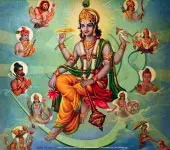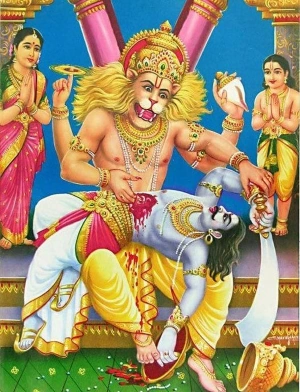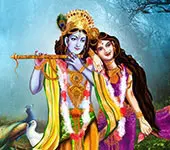This audio tells you about - 1. Whether premarital and extramarital relations are permitted in Hinduism 2. Three kinds of desires permitted in dharma 3. How spirituality is not frugal existence 4. How bhakta doesn't follow the common path of spirituality.
What does Veda say about periods?
As per Krishna Yajurveda Kanda 2. Prashna 2. Anuvaka 2, women accepted part of Indra's brahmahatya dosha in return for permission for physical relationship only for pleasure. Until then, physical relationship was permitted only for procreation. A woman's body carries this sin during menstrual days. Vedic tradition advises vrata during these days, which has several health and spiritual benefits.
What is the sanskar related to conception?
Conception at an auspicious time accompanied by divine worship and chanting of mantras for begetting a healthy and noble progeny is called Garbhadana sanskar.
What is udaseenata (उदासीनता) in bhakti?
Narada-bhakti-sutra.9 talks about udaseenata which is indifference or lack of concern towards worldly objects including property, friends, and relatives. Udaseenata strengthens bhakti.
What is the logic behind exclusive devotion?
In this world, everything is perishable. How can they ever take you out of worldly delusions and troubles? It is only Bhagavan who is eternal and omnipotent. It is only Bhagavan who is dependable.
Can a bhakta ignore shastras (scriptural teachings)?
No. As per Narada-bhakti-sutra.12, even after attaining oneness with Bhagavan, he should endeavor to protect the shastras. Scriptural discipline promotes and strengthens bhakti. The Shastras aid in achieving purity of mind. Bhakta performs duties enjoined by shastras as service to Bhagavan.
Why should a bhakta follow shastras?
Narada-bhakti-sutra.13 says that if the bhakta does not follow the teachings of good conduct given in the shastras, he will fall from his path. The bhakta needs to follow scriptural teachings for his own sake until perfect devotion is attained and then as an example for others.
How do bhaktas control their mind?
They will keep on watching their mind. The moment they see that it is drifting away, they will bring it back to Bhagavan.
How do the bhkatas stay focused on Bhagavan?
By- 1. Listening to his greatness. 2. Telling his greatness to others. 3.Singing his glories. 4. Chanting his divine names. 5. Meditating upon his form. 6. Worshiping his idol.
Quiz
What is philosophy called in the Vedic system?Transcript
(Click here to read more)
We were looking at why many bhaktas are not very wealthy, some of them are even poor. Isn’t this a contradiction to the theme Dharma–Artha–Kama-Moksha, the four goals of life? If bhakti is the parama-dharma, then it should generate wealth leading to achievement of desires. Why is this not guaranteed for the bhakta? This path, Dharma-Artha-Kama-Moksha is for the conventional man, common man. When he operates within the confines of dharma, makes a livelihood, then wealth may be generated which they can utilize to ac....
Transcript
(Click here)
We were looking at why many bhaktas are not very wealthy, some of them are even poor.
Isn’t this a contradiction to the theme Dharma–Artha–Kama-Moksha, the four goals of life?
If bhakti is the parama-dharma, then it should generate wealth leading to achievement of desires.
Why is this not guaranteed for the bhakta?
This path, Dharma-Artha-Kama-Moksha is for the conventional man, common man.
When he operates within the confines of dharma, makes a livelihood, then wealth may be generated which they can utilize to achieve desires, again within the confines of dharma.
There is nothing wrong in this because this is how the world runs.
Unless I earn, how will I provide for my family?
Family has to be there.
Vamsha-vriddhi has to be there.
Procreation is a primary dharma.
Santanotpatti is a primary dharma.
You can’t shy away from it.
Then you have to provide for them.
For that, you have to earn.
When you generate wealth, then the question comes how to utilize it?
This is what the third purushartha kama tells you.
There is nothing wrong with following this path.
But bhaktas are exclusive people.
They don’t belong to the conventional ordinary category.
They are not bothered, whether they have wealth or not.
What will you do with wealth when there is no other desire than to be with the Lord, always.
Let’s have a brief look at what are the permitted desires within the four-fold path of Dharma-Artha-Kama-Moksha.
There are three kinds of desires permitted within the confines of dharma: lokeshana, putreshana and vitteshana.
Lokeshana: desire for better worlds, better states, such as Swarga.
To attain Swarga, you can do yajnas, you can do dana, you can undertake pilgrimage.
All these, they require money.
The money that you earn, can be utilized for these.
There is nothing wrong.
You can utilize your money to make even this world a better world.
There is nothing wrong in it.
By sharing, by sharing it with others, helping others in need.
The second kind of desire, putreshana: to have a progeny.
Everyone need not be a brahmachari.
In fact, when they are young, everyone is supposed to pass through the ashrama of brahmacharya.
They are not supposed to be brahmacharis throughout life.
What is this period of brahmacharya?
The body becomes ready to procreate, so the accompanying physical tendencies have come into the body, desire for physical relationship has come into the body, but then you restrain it.
This is brahmacharya that every single person has to observe.
So premarital relationships are ruled out in dharma.
This restraint is necessary and is continued even in the ashrama of the grihastha.
Shastra says, observe restraint on certain days, such as amavasya, purnima, then even such a householder is considered a brahmachari.
The importance is on the power to restrain oneself against physical urges, bodily urges.
So the brahmacharya-ashrama is the training period, the intense training period.
And then brahmacharya is continued even through the ashrama of the householder if restraints are observed.
You will be surprised.
The women once got a boon from Devendra.
They got a boon for some help that they rendered to Devendra.
When Indra asked them what boon they wanted they said we should be able to have physical relationship even while being pregnant, up to childbirth.
Without neither us nor our husbands having the risk of incurring a sin.
Prior to this, physical relationship was permitted only for procreation.
Whatever modern society considers as a physical relationship for pleasure, was forbidden.
This wish Indra granted.
Post this, it is no longer a sin.
I am quoting from Veda.
Not anywhere else; not some bizarre western book.
You can refer to Krishna Yajurveda Kanda 2, Prashna 2, Anuvaka 2 starting with- Twastha hataputraha...
So physical relationship for pleasure also is permitted in dharma.
But not extramarital relationships, not premarital relationships.
Physical relationship within the four boundaries of marriage: not before, not outside.
So, putreshana essentially means family.
Then upkeep of the family, you can spend on this.
There is nothing wrong.
It need not be a frugal existence.
We have seen, many Rishis when they get married, they roam around to different beautiful worlds.
For example Kardama Maharshi and Devahuti, when they decided to consummate their marriage, they roamed around beautiful gardens in different worlds.
The ambiance for Kamadeva to act on the body is to be created.
So we are not talking about frugal, gloomy existence.
These are all permitted.
Spending for these is permitted.
You must have seen it in Purana serials and movies the wife being addressed by the husband as Devi.
It is the husband’s responsibility to keep his wife like a Devi in all sense.
Giving respect, beautiful clothes, ornaments.
This is what is there for the grihasthashramee.
There is nothing wrong in this.
There is nothing wrong in having such desires, earning for them and spending for them.
You should understand dharma, many of your wrong ideas about adhyatma will go away.
But do everything with viveka.
Where is this leading me?
This should be there in the mind.
You should be alert.
The third kind of desire is vitteshana.
If these are the purposes you want to earn for, if these are what you would spend what you earn on, then there is nothing wrong in desiring for wealth also.
Sanatana Dharma is quite liberal, do you know that?
As long as you don’t deviate from dharma, you have a lot of freedom.
Adhyatma is not a dry gloomy life.
But bhaktas, they are different, they have no desires, they are not bothered whether wealth comes to them or not.
There are hundreds of channels on TV.
Are you really bothered about what is going on in each and every one of them?
You will have one or two or three of your favorite channels.
You are only concerned about them.
The bhakta is also like this.
He or she is not really bothered, about what others are doing.
They are in their own world.
So it is not even necessary that you should earn wealth and then spend it the proper way.
If that is what happens to you, do it that way.
If wealth comes to you, spend it properly.
If wealth doesn’t come to you, then you don’t even have the botheration of spending it properly without incurring sin.
Recommended for you
The six kinds of avataras of Sri Hari
 Click here to know more..
Click here to know more..
A Potful Of Wisdom

This story for children is about how Birbal prepared a potful of wisdom for the king of Lanka.....
Click here to know more..Narasimha Bhujanga Stotram

ri'tam kartumevaashu namrasya vaakyam sabhaastambhamadhyaadya aavirbabhoova.....
Click here to know more..
English Topics
Bhagavatam
Click on any topic to open
- 65 Bhagavan's External Deeds
- 64 Is the Body Yours?
- 63 What's So Great About The Stories Of Sri Krishna
- 62 What To Do If You Just Don't Have Interest In Bhagawan
- 61 Which God Should I Worship?
- 60 How To Observe Dharma Properly
- 59 Devotee's progress
- 58 Which Guruji Can You Trust
- 57 Bhagawan Is Beyond Human Comprehension
- 56 The Missing Piece: Why Your Spiritual Practices Are Not Working
Please wait while the audio list loads..
30
Ganapathy
Shiva
Hanuman
Devi
Vishnu Sahasranama
Mahabharatam
Practical Wisdom
Yoga Vasishta
Vedas
Rituals
Rare Topics
Devi Mahatmyam
Glory of Venkatesha
Shani Mahatmya
Story of Sri Yantra
Rudram Explained
Atharva Sheersha
Sri Suktam
Kathopanishad
Ramayana
Mystique
Mantra Shastra
Bharat Matha
Bhagavatam
Astrology
Temples
Spiritual books
Purana Stories
Festivals
Sages and Saints
